外研社八年级上M1导学案
外研版八年级英语上Module 1 Unit 1 导学案
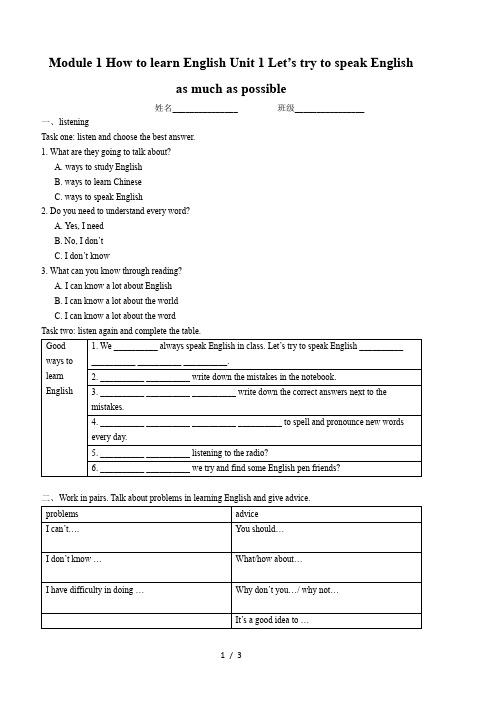
Module 1 How to learn English Unit 1 Let’s try to speak Englishas much as possible姓名_______________ 班级________________一、listeningTask one: listen and choose the best answer.1. What are they going to talk about?A. ways to study EnglishB. ways to learn ChineseC. ways to speak English2. Do you need to understand every word?A. Yes, I needB. No, I don’tC. I don’t know3. What can you know through reading?A. I can know a lot about EnglishB. I can know a lot about the worldC. I can know a lot about the wordTask two: listen again and complete the table.Work in pairs. Talk about problems in learning English and give advice.二、练习一、短语翻译:1.欢迎回来____________________________2.谈论_________________________________3.学英语的好方式_______________________4.让我们···____________________________5.尽力做某事____________________________6.尽可能多地____________________________7.为何不···____________________________8.写下_________________________________9.忘记做某事____________________________10.做某事是个好主意_______________________11.···怎么样呢?____________________________12.听收音机_________________________________13.对···有好处______________________________14.对···也是如此____________________________15.逐步认识到···____________________________16.写信给某人_______________________________17.同意某人_________________________________二、句子翻译(表示建议的句型结构)1.在课堂上,我们应该总是说英语_______________________________________________________________________________ 2.让我们试着尽可能多地说英语吧_______________________________________________________________________________ 3.不要忘记把正确答案写在错误的旁边_______________________________________________________________________________ 4.每天大声拼读新单词是个不错的主意_______________________________________________________________________________ 5.听收音机怎么样呢?_______________________________________________________________________________ 6.我们为何不试着找一些英文笔友呢?_______________________________________________________________________________ 三、Writing.Mark在学习英语的过程中遇到了一些问题,请你给他一些建议。
外研版 八上英语 Module 1 Unit 1 导学案(无答案)
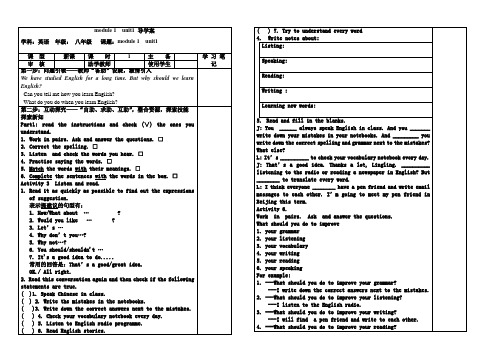
---I read English stories.5. ---What should you do to improve yourspeaking?---I always speak English in class.第三步:反馈拓展——教师“补助”点评总结,提升知识与情感。
学生“再助”查漏补缺,复习巩固。
Language points•Welcome back (to)… 欢迎回来/回到…•talk about sth 谈论某事/ talk to /with sb… 和某人交谈•Should +v原形应该做。
•as much as possible 尽可能多的。
•. Why not /why don’t you+v原形为什么不。
?•That’s a good idea. 真是个好主意。
•write down 写下。
•Forget to do sth/ doing sth 忘记去做某事/忘记做了某事。
•What else? 还有什么?•It’s a good idea to do sth . 做某事的好主意。
•How about /what about+ving 。
怎么样?•that’s good for…对。
有好处•need to+v原形。
需要做某事•I get to know a lot about the world through reading。
通过阅读我对世界了解了许多。
•Why don’t we+v原形。
我们为什么不。
•try to do sth尽量做某事•try not to do sth 尽量不去做某事. write to sb 给某人写信•agree with sb。
同意某人Do some exercises:1. Fill in the blanks:(1) She should (go) to school early.(2) Why don’t you (play) basketball?(3) How about (eat) noodles?(4) There are five (mistake) in your homework.(5) She is going to (help) his father.(6) It’s a goo d idea to (get) up early.(7) He (play) football very well.(8) My mother has six (pen friend).2. Choose the words to complete the dialogue:Good idea. Why don’t you, What else, Let’s Why not How about, practice speaking, OK, Excellent! All right 1. A: Do you like English?B: Yes, why?A: _______ listen to an English song after class!B: ________.2. A: What are you going to do this evening?B; I think I will stay at home.A: ___________________ watch an English film with me?B: ______________.3. A: This English article is difficult.B: ____________________ choose an easier one?4. A: How can I speak English well.B: You should often _______________ English5. A: _____________________ write down the correct words next to the mistakes?B: ________.6. A: Mum, I have swept the floor,_________ should I do?B: That’s OK. Thank you.7. A: ___________________ talking to our foreign teacher?B: _________.8. A: I’m not good at Engl ish.B: _____________________ speak more English in class and listen to the teacher carefully?A: ___________, I will.Homework :1.copy and learn the new words by heart.2. Write five new advice about learning English well.3.Write a short passage about how to learn English well in yourexercise book.课后反思:。
新外研社八年级上Module 1How to learn English导学案
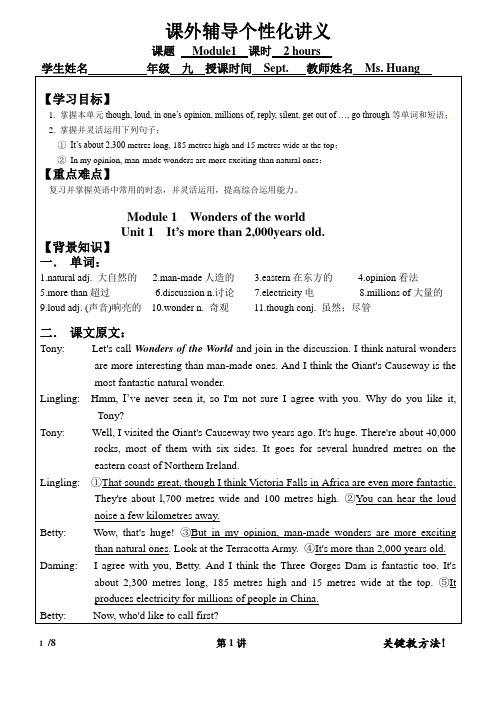
二. 课文原文:
Tony: Let's call Wonders of the World and join in the discussion. I think natural wonders are more interesting than man-made ones. And I think the Giant's Causeway is the most fantastic natural wonder. Lingling: Tony: Hmm, I’ve never seen it, so I'm not sure I agree with you. Why do you like it, Tony? Well, I visited the Giant's Causeway two years ago. It's huge. There're about 40,000 rocks, most of them with six sides. It goes for several hundred metres on the eastern coast of Northern Ireland. Lingling: ①That sounds great, though I think Victoria Falls in Africa are even more fantastic. They're about l,700 metres wide and 100 metres high. ②You can hear the loud noise a few kilometres away. Betty: Daming: Wow, that's huge! ③But in my opinion, man-made wonders are more exciting than natural ones. Look at the Terracotta Army. ④It's more than 2,000 years old. I agree with you, Betty. And I think the Three Gorges Dam is fantastic too. It's about 2,300 metres long, 185 metres high and 15 metres wide at the top. ⑤It produces electricity for millions of people in China. Betty:
新版外研版英语八年级上册M1U1导学案
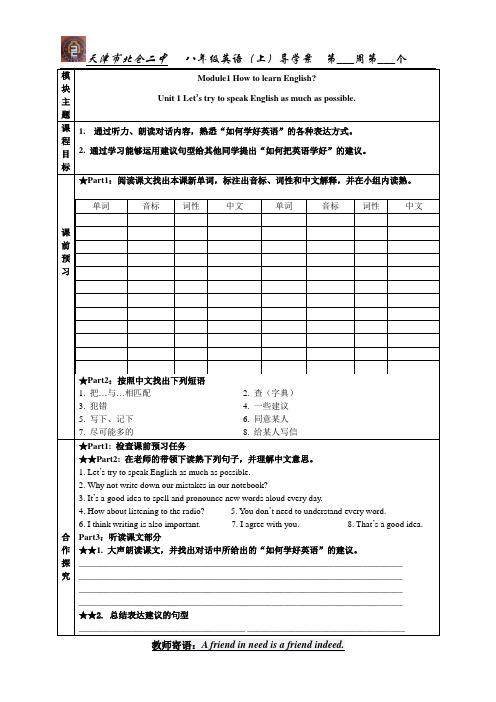
4).在课堂上尽量说英语。________ _________ speak English in class.
5).我同意你的看法。I __________ __________ you.
★★3.单项选择
__________________________________________ ______________________________________
__________________________________________ ______________________________________
5.写下、记下____________________ 6.同意某人____________________
7.尽可能多的____________________ 8.给某人写信___________________
合作探究
★Part1:检查课前预习任务
★★Part2:在老师的带领下读熟下列句子,并理解中文意思。
★★3.听读课文,并完成书上P3的表格练习。
★Part4.课文练习部分
★1.找出本课中不理解的短语和句型,并记录下来。
_______________________________________________________________________________
_______________________________________________________________________________
★2.完成句子
1).请写下你的名字和地址。Please ____________ _____________ your name and address.
【教育资料】外研版八年级英语上册Module 1导学案(无答案))学习精品
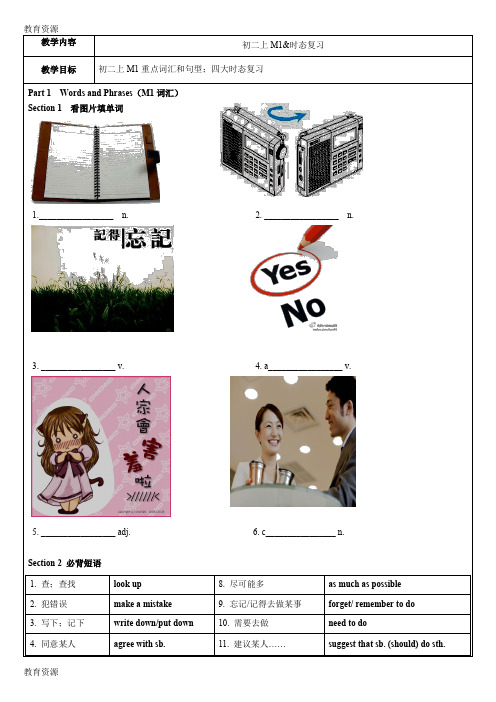
4. I’m going to ________(visit) the Great Wall inBeijing.
5. How about _______________(buy) a cake for our daughter?
How aboutswimmingin the sea?去海里游泳怎么样?
Section 1用括号内动词的适当形式填空。
1. Would you like _______(go) shopping with me?
2. Let’s __________(meet) at 14:00 at the school gate.
A. watchB. watchedC. am watching
() 10. I ____ to the cinema. Would you like to come with me?
A. goB. am goingC. went
二、用括号中所给词的适当形式填空
1. Listen! who_________ (sing) in the music room? Oh, Mary________(sing) there.
practise doing
13.与某人谈论某事
talk about sth. with sb.
7.将A与B相连(配对)
match A with B
14.对某人微笑
smile at sb.
Part 2 Language Points
1. should某人+should+do sth.,表示“应该做…..”
外研版八年级上册Module1 Unit1 导学案

( )It’s a good way to start a conversation by saying“Hello! How are you?”
( )Zhang Lei remembers the new words quickly.
学习难点
To give advice on English learning.
学习过程(学案)
备注
【自主学习】
单词学习:
1.vocabulary___________ 2.improve_______ 3.basic______ 4.time______
5.advise____________ 6. Shy____________ 7. Conversation___________
_____________________________________________________________
3.To forget new words is natural.(同义句)
____________________________________________________________
C. Try to find some English pen friends.
D. Write down mistakes.
E. listen to the radio.
F. Write down the correct answers next to the mistakes.
G. Listen for key words and main ideas.\
8.Why not ________(listen) to music when you are tired?
Module1Unit1导学案外研版英语八年级上册
Module1How to learn English主题内容及学习目标主题范畴:人与自我子主题:恰当的学习方法与策略1. 语言知识:能够听懂关于英语学习的话题,读懂相关阅读材料,并给出关于英语学习的建议。
2. 文化知识:学会照顾对方的感受,能够对于他人的建议表示感谢。
3. 语言技能:掌握提出建议以及回应建议的句型。
4. 学习策略:能够和同学谈论关于英语学习的方法及学习建议。
Unit1Let's try to speak English as much as possible.课前预习单词和短语重点单词名词1. (相关的)两个人,一对pair•(短语)一对a pair of2. 拼写spelling•(v.)拼;拼写spell3. 词;单词;字word4. 意义;意思meaning•(v.)意思是;意味着mean5. 句子sentence6. 词典;字典dictionary•(pl.) dictionaries7. 语法grammar8. 字母letter9. 错误;过错mistake•(短语)犯错误make a mistake10. 意见;建议advice•(短语)一条建议a piece of advice11. 笔记本notebook12. 电台;广播radio•(短语)听广播listen to the radio13. 发音pronunciation重点单词动词14. 练习practise•(短语)练习做某事practise doing sth.15. 找到与……相配之物,使相配;使成对match•(短语)把……和……匹配match … with …根据语境或提示,完成填空。
1. I heard him crying a loud,so I comforted(安慰) him to make him feel better.2. Nobody is perfect, so everyone makes m istakes.3. You need to practise(练习) speaking English every day.4. The teacher gives us some a dvice in writing.5. My father f orgot to feed(喂养) the dog, so it was still hungry.6. Do you know the p ronunciation of the letter“m”?7. The m ain idea of this passage is about the friendship(友情) between two boys.8. I can find the meaning of the new word by looking up(查;查找) a dictionary.9. You should remember the words and read the texts as much as possible(尽可能多地).10. I'm afraid I can't a gree with you.佳句仿写1. We should always speak English in class.2. Let's try to speak English as much as possible.3. Why not write down our mistakes in our notebooks ?4. It 's a good idea to spell and pronounce new words aloud every day .5. How about listening to the radio ?句子仿写你应该今晚完成英语作业。
八年级英语上册 Module 1 Unit 1导学案 外研版
Module 1 Unit 1 Try not to translate every word一、目标导学导学前测用所给词的正确形式填空:1. It’s a good idea ________ (check) your answer.2. Try ______(not think) about all the new words.3. Why don’t you _______(take)a bus to go there?4. How about _______(watch) English film?5. Why not _______(have) a break?一)学习目标:(1)掌握提出建议的表达方式,如:How about…? Why don’t you…? It’s a good idea to…You should …Try to…(2)Master the words and expressions in Unit 1.(3)能够用英语给别人提建议。
二.互动导学过程:Step1. To learn the new vocabularies of this unit.二)首字母填空:1. Can you t_______Chinese into English?2. Is there anything new in today’s n_______?3. Listening to English radio can i________your listening.4. “C______the homework and hand it in before class.” The teacher said to us.5. Why don’t you write the c________ words next to the mistakes?Step 2.Listening and reading:1) Ask students to listen to the conversation between Ms Jamesand her students carefully with books closed. Then ask students to listen again and finish activity 4.2) Practise in pairs.3) Put the following into English.1. 把拼写错误记在笔记本上是个好主意。
外研版八年级英语上册Module1导学案(无答案))
教学内容初二上M1&时态复习教学目标初二上M1重点词汇和句型;四大时态复习Part 1 Words and Phrases(M1词汇)Section 1 看图片填单词1._________________ n.2. _________________ n.3. _________________ v.4. a_________________ v.5. _________________ adj.6. c________________ n.Section 2 必背短语1. 查;查找look up 8. 尽可能多as much as possible2. 犯错误make a mistake 9. 忘记/记得去做某事forget/ remember to do3. 写下;记下write down/put down 10. 需要去做need to do4. 同意某人agree with sb. 11. 建议某人……suggest that sb. (should) do sth.5. 请求(给予)ask for 12. 建议某人去做某事advise sb. to do6. 练习做某事practise doing 13. 与某人谈论某事talk about sth. with sb.7. 将A与B相连match A with B 14. 对某人微笑smile at sb.(配对)Part 2 Language Points1. should 某人+should+do sth.,表示“应该做…..”【例】You should improve your French. 你应该提升你的法语。
2. Let's+do sth.. 让我们.....【例】Let's go home together. 我们一起回家吧。
【拓展】let us与let's的区别当请求对方允许自己(第一人称复数)做某事时,要用let us。
外研版英语八年级上册Module 1 《Language in use》导学案
Module 1 How to learn EnglishUnit 3 Language in use第一课时一、学习目标:1. 复习并学会灵活运用本模块重点词汇和句型2. 巩固熟练运用本模块所学知识对有关英语学习的话题给别人提建议二、学习重点:通过复习巩固熟练运用本模块重点词汇和句型关于英语学习给别人提出建议三、学习难点:灵活运用本模块所学知识提出建议课前预习一、使用说明与学法指导:1. 自主复习Unit 1, 2的重点词汇和句型2. 熟背Unit 1的对话和Unit 2的文章,有疑惑的地方用红笔标记并在组内探讨解决二、教材助读:1. 理解并熟读本单元Language practice部分的句子,尝试总结有关提出建议的表达2. 自主学习课本语法部分关于本模块的知识三、预习自测(一) 回顾完成下列单词及短语:1 . 建议,提议(名词)2 . 理解;明白3 . 拼写4 . 广播5 . 大声地6 . 改进,改善7 . 应该 8 . 理解;明白9. 害怕做某事 10. 开始谈话11. 建议某人做某事 12. 向……提出意见13. 对某人微笑 14. 忘记做某事(二) 回顾总结提建议的句型:_____________________________________________________________________________ _____________________________________________________________________________ _____________________________________________________________________________ _____________________________________________________________________________ _____________________________________________________________________________ _____________________________________________________________________________四、我的疑问:_____________________________________________________________________________ _____________________________________________________________________________课内探究一、情景导入:借助Language practice中的句子回顾本模块重点二、质疑探究(一) 句型总结1. 回顾本模块所有提建议的句子2. 巩固提建议的句型______________________________________________________________________________________________________________________________________________________________________________________________________________________________________________________________________________________________________________________________________________________________________________________________________________________________________________________________________________(二) 逐步完成本单元练习,巩固词汇和句型的运用三、当堂检测(一) 单项选择( ) 1 . Don’t forget _________ me as soon as you arrive in Beijing.A . callingB . callsC . callD . to call ( ) 2 . Write them _________ a piece of paper and put them in your bedroom.A . onB . toC . downD . back( ) 3 . She told us the good news with _________ smile ___________ her face.A . a ; inB . an ; inC . a ; onD . an ; on ( ) 4 . Can you __________ it in English?A . speakB . sayC . talkD . tell( ) 5 . __________ natural to forget new words.A . ItB . ThatC . ThisD . It’s(二) 默写本模块关于提出建议的句子___________________________________________________________________________________________________________________________________________________________________________________________________________________________________________________________________________________________________________________________________________________________________________________________________________________________________________________________________________________________________________________________________________________________ 四、课后反思__________________________________________________________________________________________________________________________________________________________课后训练一、完形填空 (10分)There is some 1 for you about learning English well. Firstly, it's a good way 2 your English 3 reading, so do more reading every day, but 4 try to translate every word when you read an Englis h article. Secondly, do more listening exercises. You should repeat the sentences 5 you hear them. It's good 6 your pronunciation. Sometimes, we offer (提供) exercises to you to number the pictures, or find the mistakes in the sentences and then correct 7 . Thirdly, try to speak to foreigners. Don't be afraid of 8 mistakes. Take a deep breath and start a conversation with them. Always remember to enjoy yourself9 English learning, 10 you will surely be good at it sooner or later. ( ) 1.A. advice B.advices C.information D.ways( ) 2.A. improve B.to improve C.imp roves D.improving ( ) 3.A. with B.in C.by D.at( ) 4.A. no B.not C.don't D.not to( ) 5.A. about B.before C.by D.when( ) 6.A. to B.with C.for D.at( ) 7.A. it B.them C.her D.his( ) 8.A. make B.making C.makes D.to make( ) 9.A. in B.at C.with D.by( ) 10.A. and B.or C.but D.finally (三) 阅读理解The best way of learning EnglishThe best way of learning a language is by using it. The best way of learning English is talking in English as much as possible. Sometimes you will get your words mixed up and people will not understand you. Sometimes people will say things too quickly and you can't understand them. But if you keep your sense of humour, you can always have a good laugh at the mistakes. Don't be unhappy if people seem to be laughing at your mistakes .It is much better for people to be laughing at your mistakes than to be angry because they don't understand what you are saying. The most important rule for learning English is, “Don't be afraid of making mistakes; everyone make mistakes.”( ) 1. The best way of learning a language is ______.A.to remember the grammar rules B.to use it as often as you can C.to try not to get your words mixed up D.to make a lot of mistakes ( ) 2. When people laugh at your mistakes, ______.A.you should be angry B.you must stop talking at once C.you should keep your sense of humour D.you must be very careful next time( ) 3. The most important rule for learning English is ______.A.to try to make fewer mistakes B.not to be afraid of making mistakesC.to be brav e to talk to others in English D.both B and C( ) 4. Tom, Jerry, Bob and M ike are learning English. Who do you think is right?A.Tom tries to use English as much as possible.B.Jerry is always shy of sp eaking English.C.Bob is afraid that others may laugh at him.D.Mike never tries to talk to others in English.( ) 5.The passage seems to tell us ______.A.that you should learn to laugh at mistakesB.that it's interesting to learn EnglishC.what to do when you make mistakes while talking EnglishD.how to make others understand youUnit 3 Language in use第二课时一、学习目标:1. 学会指定有关英语学习的计划2. 练习巩固本模块重点知识3. 学会合理安排计划自己的学习和生活二、学习重点:学会制定有关英语学习的计划,练习巩固本模块重点知识三、学习难点:学会制定有关英语学习的计划课前预习一、使用说明与学法指导:1. 自主学习Around the world2. 思考并组内探讨如何制定自己的英语学习计划二、教材助读:1. 预习Around the world,了解关于英语学习的多种媒介2. 预习Module task,小组讨论如何指定自己的英语学习计划三、预习自测完成Module Task部分四、我的疑问:_____________________________________________________________________________ _____________________________________________________________________________课内探究一、情景导入交流检查预习作业二、质疑探究组内交流,以对话形式对Module task进行问答三、当堂检测个人活动,以完整的句子对自己及小组成员Module task表格内容进行描述,在班级内展示四、课后反思_____________________________________________________________________________ _____________________________________________________________________________课后训练写一篇小作文,制定你自己关于英语学习的计划。
- 1、下载文档前请自行甄别文档内容的完整性,平台不提供额外的编辑、内容补充、找答案等附加服务。
- 2、"仅部分预览"的文档,不可在线预览部分如存在完整性等问题,可反馈申请退款(可完整预览的文档不适用该条件!)。
- 3、如文档侵犯您的权益,请联系客服反馈,我们会尽快为您处理(人工客服工作时间:9:00-18:30)。
UNIT1重点单词拼写翻译_____________改正_____________将…..配对_____________数字、号码_____________ 重复_____________语法_____________语音_____________ 拼写_____________学期_____________建议_____________错误_____________ 笔记本___________重点短语1.新学期_____________2.给出一些建议___________________3.一条建议_____________4.寻求建议_____________5.为什么不________________6.写下、记下_____________7.讲英语_____________8.在课上_____________9.犯错误_____________ 10.好主意_____________11.。
怎么样_____________________12.听录音_____________ 13.读报纸_____________14.翻译每个词语_____________15. 把……译成…_____________ 16. 为……翻译_____________17.有一个笔友_____________ 18.写邮件_____________ 19. 彼此、互相_____________20.会见某人_____________21.好极了_____________ 22.在学校的管弦乐队演奏_____________23.开音乐会_____________ 24.帮助某人做某事__________用所给动词的适当形式填空。
1.He is going to (watch) TV this Sunday.2.Why don’t you ( go) to movies?3.We should ( study ) hard.4.It’s a good idea (read ) English in the morning.5.How about (play) football this afternoon?6.-What aer they doing?-They (listen) ot music.7.Can you (help ) me with my English?8.Hw often write the correct (spell )next to the mistakes.Ⅱ单项填空。
1.Our new teacher is going to give us some this term.A. advicesB. an adviceC. adviceD. a advice2.This is a new word.Please .A.write down itB.write it downC.write down themD.write them down3.-What should we do to learn English well ?-We should English loudly in the morning?A.readB.to readC.readingD.reads4.-Are there any mistakes your homework?-Yes,there are.A.atB.withC.readingD.on5.-What can I do this weekend?-Why don’t you at home.A.having a good restB.to have a good restC.has a good restD.have a good rest6.Boys and girls ,try not in class.A.sleep B to sleep C.sleeping D.sleeppingⅢ根据句意及词首字母提示完成单词。
1.When you read a newspaper in English,don’t t every word.2.I didn’t hear you clearly (清楚地)just now (刚才),please r the sentence.3.Zhao Ming always works hard in our class. He is a very e student.4.Do you often listen to the r in English.5.There is a mistake in the notebook,you should c it.三.语法总结时态(一)一般现在时1.表示现阶段经常性,习惯性的动作或存在的状态,特征或客观真理。
常用的时间状语有often, usually, always, every day\week 等.2.在条件状语和时间状语从句中,用一般现在时表将来,例如:if you don’t go soon,you will be late. 如果你不快点去,你就会迟到的.3.begin, come, go, leave, start, stop, arrive, return, open, close等动词常用一般现在时表示按计划规定将要发生的动作。
例如:class begins at eight in the morning.早上八点钟开始上班。
(二)一般过去时一般过去时表示过去某个时间发生的事,存在的状态或过去反复发生的动作。
常用的时间状语有yesterday, yesterday morning\afternoon\evening, last week/month/year, in 1980(三)一般将来时1.一般将来时表示在将来的某个时间要发生的动作或存在的状态,常与表示将来的时间状语tomorrow, tomorrow morning/afternoon/evening, next week/month/year 等连用2.一般将来时有以下几种形式(1)助动词will+动词原形注:在疑问句中,当主语是第一人称I或we时,常用助动词shall(2)“be going to +动词原形”表示即将发生某事或者打算,计划要做某事(3)come, go, start, move, leave, travel等动词常用进行时态表示按计划将要发生的事例如:the whole family’s going for two months. 全家要去两个月。
(四)现在进行时1.现在进行时由“am/is/are+现在分词”也可以表示正在进行的动作2.“系动词+介词/副词(短语)”也可以表示正在进行的动作3.表示感觉、愿望、和状态的某些东西(如:hope, smell, hear, see, like等)一般不用进行时态例如:I hope to go to collage next year. 我希望明年上大学。
提建议的几种表达方法句型意思举例You should/shouldn’t....你应该/不应该……You shouldn’t copy others’ homework.How/What about...? ……怎么样? What about going for a picnic?Why don’t you/Why not...?为什么不……?Why not ask the teacher for help?Don’t forget....别忘了……Don’t forget to read an English story.Try to.... 努力……Try to remember ten words a day.Try not to.... 尽量不要……Try not to look up the words in a dictionary while reading.Shall we...? 我们……好吗? Shall we go to see Mr.Black?Let’s....让我们……吧。
Let’s listen to music and films inEnglish.You’d better (not)....你最好(不要)……You’d better not play with fire.UNIT2重点单词其他_____________收音机___________报纸_____________ 信息_____________笔友_____________各个_____________好极了_____________管弦乐队_____________发送_____________语言_____________提高_____________主要的_____________看_______ 猜_____________ 你自己_____________害羞的_____________谈话_____________重点短语发送_____________征求、寻求意见_____________提高英语_____________三个基本问题___________________喜欢看英文电影_________________ 听英文歌曲_____________它太占时间_____________这是学英语的一种很好的方法____________________ 谈论_____________ 猜新单词的意思_____________ 过得快乐_____________外教_____________与某人说话_____________我该怎么办_____________开始一段谈话____________________深呼吸_____________记得做过某事_____________记得去做某事_____________忘记做过某事_____________忘记去做某事_____________最好的建议_____________重点句子1.我将会给你一些建议,为什么不把它记下来呢?__________________________________________________________________________2.你应该总是在课堂上说英语。
__________________________________________________________________________3.你应该在笔记本上写下你犯的错误。
为什么不在你错误的旁边写上正确的拼写和发音呢?__________________________________________________________________________4.每天检查你笔记本上的单词,这是一个好主意。
